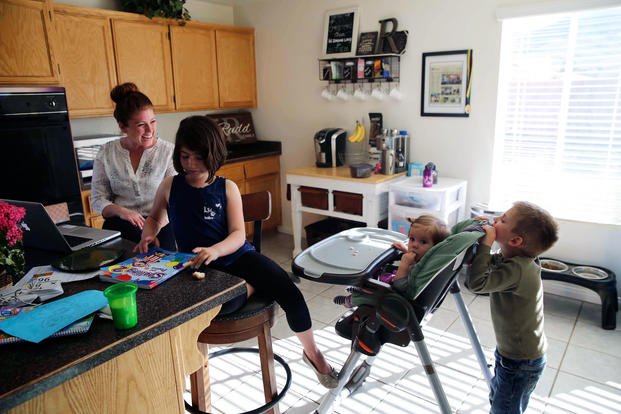Stage 3. Sustainment
- New routines established
- New sources of support
- Feel more in control
- Independence
- Confidence ("I can do this")
- Time frame: months two thru five
Sustainment is a time of establishing new sources of support and new routines. Many rely on the Family Readiness Group (FRG), which serves as a close network that meets on a regular basis to handle problems and disseminate the latest information. Others are more comfortable with Family, friends, church or other religious institution as their main means of emotional support. As challenges come up, most spouses learn that they are able to cope with crises and make important decisions on their own. They report feeling more confident and in control. During the sustainment stage, it is common to hear military spouses say: "I can do this!"
More deployment support services.
One challenge, during this stage, is the rapid speed of information provided by widespread phone and e-mail access. In the near future, one can even expect that individual Soldiers will have the ability to call home with personal cellular phones. Over long distances and without face-to-face contact, communications between husband and wife are much more vulnerable to distortion or misperception. Given this limitation, discussing "hot topics" in a marriage can be problematic and are probably best left on hold until after the deployment when they can be resolved more fully. Obvious exceptions, to this rule, include a Family emergency (i.e. the critical illness of a loved one) or a joyful event (i.e. the birth of a child). In these situations, the ideal route of communication is through the Red Cross so that the Soldier's command is able to coordinate emergency leave if required.
On a related note, many spouses report significant frustration because phone contact is unidirectional and must be initiated by the Soldier. Some even report feeling "trapped" at home for fear that they will miss a call. Likewise, Soldiers may feel forgotten if they call - especially after waiting a long time on line to get to a phone - and no one is home. This can lead to anger and resentment, especially if an expectation regarding the frequency of calls is unmet. Now that Internet and e-mail are widely available, spouses report feeling much more in control as they can initiate communication and do not have to stay waiting by the phone. Another advantage of e-mail, for both Soldier and spouse, is the ability to be more thoughtful about what is said and to "filter out" intense emotions that may be unnecessarily disturbing. This is not to say that military couples should "lie" to protect each other, but rather it helps to recognize that the direct support available from one's mate is limited during the deployment.
Furthermore, rapid communication can lead to unanticipated rumors, which then circulate unchecked within the Family Readiness Group (FRG).5 The most damning rumor involves an allegation of infidelity that is difficult to prove true or false. Other troubling rumors may include: handling the deployment poorly, accidents or injuries, changes in the date of return, disciplinary actions, or even who calls home the most. Needless to say, such rumors can be very hurtful to Soldier, spouse, the FRG. At its worst, unit cohesion and even mission success can suffer. Limiting the negative impact of such rumors is a constant challenge for unit leaders and chaplains. It is extremely important to keep Soldiers and Family members fully informed and to dispel rumors quickly. In fact, rumors lose their destructive power once the "secret" is exposed:
There was a rumor that a commander's wife reported that a deployed Soldier was having an affair. Members of the FRG, who were very upset, related the details to their deployed spouses. Senior unit leaders decided not to tell the commander because the allegations were deemed too inflammatory. Unfortunately, unit morale and cohesion began to suffer greatly as the rumor spread throughout the ranks. A month later, the commander finally learned of this destructive rumor, which had been undermining his authority to lead. He immediately confronted his wife, senior leaders and the Soldier about whom the allegation had been made. Evidence about the validity of these allegations, or how the rumor started in the first place, could not be found. In response, the commander issued a very firm policy regarding exposing all rumors - whether they be true or false. Unit morale and cohesion, although badly bruised, then began to recover.
The response of children to extended deployment of parent is very individualized and also depends on their developmental age: infants, toddlers, preschool, school age, and teenagers. It is reasonable to assume that a sudden negative change in a child's behavior or mood is a predictable response to the stress of having a deployed parent.
| Negative Changes in Children | ||||
| Ages | Behaviors | Moods | Remedy | |
| Infants | < 1 yr | Refuses to eat | Listless | Support for parent, pediatrician |
| Toddlers | 1-3 yrs | Cries, tantrums | Irritable, sad | Increased attention, holding, hugs |
| Preschool | 3-6 yrs | Potty accidents, clingy | Irritable, sad | Increased attention, holding, hugs |
| School Age | 6-12 yrs | Whines, body aches | Irritable, sad | Spend time, maintain routines |
| Teenagers | 12-18 yrs | Isolates, uses drugs | Anger, apathy | Patience, limit-setting, counseling |
Infants (< 1 year) must be held and actively nurtured in order thrive. If a primary caregiver becomes significantly depressed then the infant will be at risk for apathy, refusal to eat and even weight loss. Early intervention becomes critical to prevent undue harm or neglect. Pediatricians can perform serial exams to ensure growth continues as expected on height/weight charts. Army Community Services and Social Work can assist with parenting skills and eliciting Family or community support. Lastly, the primary caregiver may also benefit from individual counseling.
Toddlers (1-3 years) will generally take their cue from the primary caregiver. One issue is whether it is the mother or father who is the Soldier leaving - especially when children are very young. If the "non-deploying" parent is coping well, they will tend to do well. The converse is also true. If the primary caregiver is not coping well, then toddlers may become sullen, tearful, throw tantrums or develop sleep disturbance. They will usually respond to increased attention, hugs and holding hands. The "non-deploying" parent may also benefit from sharing their day-to-day experiences with other parents facing similar challenges. In particular, it is important for the primary caregiver to balance the demands for caring for children alone with their own needs for time for self.
Preschoolers (3-6 years) may regress in their skills (difficulty with potty training, "baby talk," thumb sucking, refusal to sleep alone) and seem more "clingy." They may be irritable, depressed, aggressive, prone to somatic complaints and have fears about parents or others leaving. Caregivers will need to reassure them with extra attention and physical closeness (hugs, holding hands). In addition, it is important to avoid changing Family routines such as sleeping in their own bed, unless they are "very" scared. Answers to questions about the deployment should be brief, matter-of-fact and to the point. This will help to contain the free-floating anxiety of an overactive imagination.
School age children (6-12 years) may whine, complain, become aggressive or otherwise "act out" their feelings. They may focus on the Soldier-parent missing a key event, for example: "will you (the Soldier) be here for my birthday." Depressive symptoms may include: sleep disturbance, loss of interest in school, eating or even playing with their friends. They will need to talk about their feelings and will need more physical attention than usual. Expectations regarding school performance may need to be a little lower, but keeping routines as close to normal is best for them.
Teenagers (13-18 years) may be irritable, rebellious, fight or participate in other attention-getting behavior. They may show a lack of interest in school, peers and school activities. In addition, they are at greater risk for promiscuity, alcohol and drug use. Although they may deny problems and worries, it is extremely important for caregivers to stay engaged and be available to talk out their concerns. At first, lowering academic expectations may be helpful; however, return to their usual school performance should be supported. Sports and social activities should be encouraged to give normal structure to their life. Likewise, additional responsibility in the Family, commensurate with their emotional maturity, will make them feel important and needed.
Unfortunately, some children may have great difficulty adapting to the stress of a deployed parent. If they are unable to return to at least some part of their normal routine or display serious problems over several weeks, a visit to the Family doctor or mental health counselor is indicated. Children of deployed parents are also more vulnerable to psychiatric hospitalization - especially in single-parent and blended Families.
Despite all these obstacles, the vast majority of spouses and Family members successfully negotiate the sustainment stage and begin to look forward to their loved ones coming home.
Keep Up with the Ins and Outs of Military Life
For the latest military news and tips on military family benefits and more, subscribe to Military.com and have the information you need delivered directly to your inbox.





















